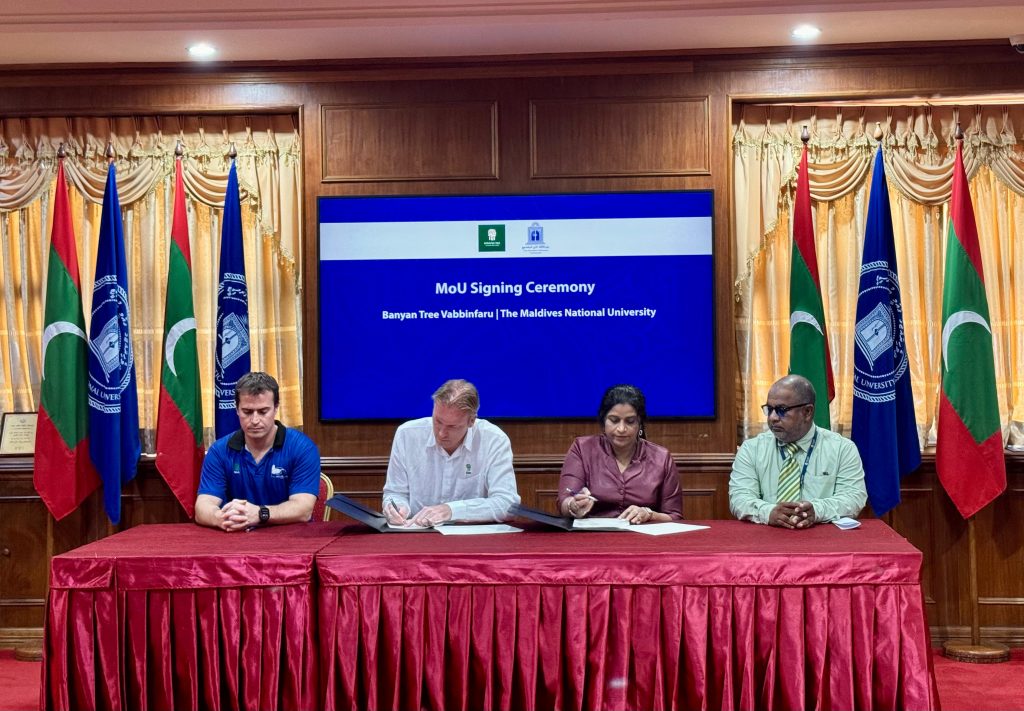MoU signing ceremony between MNU and Banyan Tree Vabbinfaru
Banyan Tree Vabbinfaru
A Landmark MoU for Conservation and Education
The Maldives National University (MNU) and Banyan Tree Vabbinfaru have formalized a groundbreaking Memorandum of Understanding (MoU) that marks a new era of cooperation in marine conservation, eco-tourism, and sustainable tourism. This visionary alliance connects the nation’s leading academic institution with one of the Maldives’ pioneering luxury eco-resorts, combining education, research, and community engagement to protect the country’s fragile natural environment.
The MoU was signed at MNU’s central campus in Malé, officiated by Vice Chancellor Dr. Aishath Shehenaz Adam on behalf of the university, and Mr. Elias Pertoft, General Manager of Banyan Tree Vabbinfaru, on behalf of the resort. More than a ceremonial exchange, this agreement represents a shared belief that conservation and sustainable development must go hand in hand with tourism.
A Living Laboratory in the Indian Ocean
The partnership focuses on changing Banyan Tree Vabbinfaru’s famous house reef and lagoon into a lively “living laboratory.” These thriving ecosystems will serve as open classrooms where MNU students and researchers can study coral reefs, seagrass beds, and megafauna in their natural environment.
This collaboration provides students with hands-on fieldwork opportunities that extend far beyond traditional academics. They work directly on the reef.
This allows them to study important issues. These issues include coral bleaching, habitat loss, and marine species behavior. In doing so, they gain practical experience that strengthens both their technical capabilities and their understanding of the interconnectedness between the ocean and the livelihoods of Maldivians.
Research with Purpose and Impact
The joint research projects under this MoU are designed not only to generate knowledge but to deliver immediate, practical outcomes. Coral reef health monitoring programs will check how well reefs can handle climate change. Long-term studies on sea turtles and reef sharks will help create sustainable conservation strategies.
These projects are different from purely academic research. They are created with input from both MNU and the Banyan Tree Marine Lab. This ensures the results are relevant to the resort’s conservation management plans. The integration of science with day-to-day eco-tourism operations helps reduce the resort’s carbon footprint, while also providing long-term ecological insights critical for sustainable development in the Maldives.
The Role of the Banyan Tree Marine Lab
A cornerstone of this collaboration is the Banyan Tree Marine Lab, the first private facility of its kind in the Maldives. The lab was created as part of the resort’s plan for sustainability. It has been involved in coral restoration, reef monitoring, and educating guests.
Through the MoU, MNU students gain access to the lab’s professional training programs.
These include scientific diving, ecological monitoring, coral transplantation, and marine awareness initiatives for local community groups. By working alongside resident marine biologists, students not only sharpen their scientific skills but also learn how conservation connects with eco-tourism, guest engagement, and community outreach.
This holistic training prepares young Maldivians to become leaders in marine science, policy, and sustainable tourism—ensuring the nation has a new generation ready to safeguard its most valuable asset: its natural environment.
Connecting Education, Tourism, and Local Communities
The Maldives is globally known for its pristine beaches and turquoise lagoons, yet the survival of its tourism industry is directly tied to the health of its ecosystems. This partnership illustrates how resorts can contribute to sustainable development by linking education, research, and eco-tourism.
Guests at Banyan Tree Vabbinfaru are also invited to engage with the Marine Lab’s programs, from coral planting workshops to guided snorkeling sessions. These experiences enrich their stay, allowing them to understand how eco-tourism can be a force for good. By participating, travelers contribute to conservation projects that offset their own carbon footprint, ensuring their visit leaves a positive impact.
Equally important is the involvement of local community groups. Educational workshops and outreach initiatives extend the benefits of the partnership beyond the resort, encouraging Maldivians to take an active role in conservation. This inclusive approach ensures that sustainable tourism supports not only ecosystems but also communities, aligning environmental protection with social development.
A Model for Sustainable Development
For the Maldives, where climate change poses existential risks, the MNU–Banyan Tree partnership offers a clear pathway toward sustainable development. By integrating conservation science into tourism operations, the collaboration demonstrates that protecting the natural environment can go hand in hand with economic growth.
Reducing the resort’s carbon footprint, creating education opportunities, and empowering local community groups are all tangible steps that showcase how eco-tourism can become a driver of resilience. The partnership is not only about protecting coral reefs and marine life. It is also about creating a sustainable future. In this future, tourism, education, and conservation support each other.
Inspiring the Next Generation of Marine Leaders
For MNU, this partnership strengthens its role in shaping the country’s future leaders. Students emerge with real-world experience, equipped to take on careers in conservation, academia, and eco-tourism. For Banyan Tree, the MoU underscores its pioneering reputation in sustainability, proving that luxury hospitality can coexist with deep environmental responsibility.
Together, the two institutions are cultivating a culture where science, community, and hospitality intersect. This model inspires future leaders to embrace sustainable development not as an option but as a necessity for survival and success in the Maldives.
A Shared Vision for the Future
Ultimately, the MoU represents more than an agreement between a university and a resort. It is a shared vision for the Maldives.
In this vision, sustainable tourism protects the natural environment. Local community groups gain power through knowledge and participation. The next generation will be ready to face global challenges with innovation and leadership.
The Maldives National University and Banyan Tree Vabbinfaru are creating a new standard. They are combining research, education, and eco-tourism. Their teamwork shows that sustainable tourism is not only about reducing harm. It is also about creating a positive impact. This includes lowering carbon footprints and building a future where the ocean and its people thrive together.
